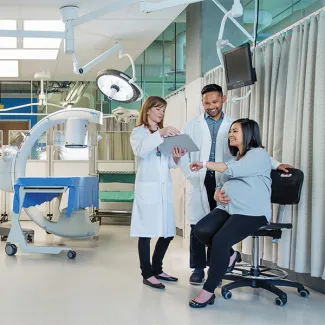Sabrina's journey from nurse clinician to leader with the MHLP

The part-time option for the Master of Health Leadership and Policy in Clinical Education was the ideal choice for Sabrina Gill, as it is enabling her to immediately apply the knowledge she’s learning in her classes to her professional practice.
Tell us about your job work.
I’m a nurse clinician at BC Children’s Hospital in Adolescent Health and Medicine, where I work with an interdisciplinary team to deliver clinical services, quality improvement projects, research initiatives and education and training.
What made you interested in the MHLP in Clinical Education?
In 2017, I was a guest at UBC Sauder’s Robert H. Lee Graduate School of Business “passion to profession” talks, which got me excited about the overlap of business and health-care leadership when it comes to policy, sustainability, collaboration and innovation.
I really liked the idea of the MHLP in Clinical Education as a interdisciplinary program, with courses in nursing and business that address clinical education and leadership, my two key areas of passion.
Through my work, I also collaborate with many professionals at UBC, and I was excited to be part of that learning community.
Why did you choose the part-time option?
It’s so important to me to be connected to my team at work: they energize me, inspire me to aim for the highest quality of care and help me thrive. I didn’t want to give that up by going to school full time; nor did I want to give up my connection to patient care.
As a mom, I also want to be a role model for my daughters, showing them that learning is for a lifetime and not just a one-time goal. By choosing the part-time option, I’ve been able to keep my 0.8 FTE work schedule.
What classes did you take in the first year of the program?
The first year of the part-time program focuses on the business and leadership classes, and in year two I will be doing the nursing and health-care classes. I’ve just finished my first semester, where I took two business classes: one on organizational leadership and one on project management.
Students from both MHLP programs and all the MEL programs take these classes together, so there’s a real mix of professional backgrounds. Learning alongside and working in groups with engineers has made me more open-minded on process and raised my awareness of the strengths that health-care providers can bring to leadership.
Have you been able to apply what you’ve learned to your work?
When you’re a part-time student, you can turn concepts into practice right away. I am also sharing what I’m learning with my team at work, and they’ve commented on my increased energy levels! I’m looking forward to applying my learnings from the project management class, where I learned that 50 per cent of your time should be on planning and the rest on implementation. I’m looking forward to bringing this forward into my practice.
Any tips for juggling work and school?
I’ve created a designated area in my house for learning by setting up a desk next to my daughters so we can do our homework together. I’m also very conscious about keeping my focus on one thing at a time – whether that’s my patients, my kids or a school project.
My interest in mindfulness meditation supports me in being in the moment. I’ve taught mindfulness to my health-care colleagues and I also facilitate an eight-week Mindfulness Awareness and Resilience Skills program for adolescents.
Anything else you want to share?
I am a woman of colour of Punjabi descent. I’m very proud to see the diversity of students and young people of colour who are furthering their education through the MHLP and wanting to take on leadership roles.
I’d also like to comment on being a mature student who’s been out of school for almost 20 years. I was a bit nervous at first, but I quickly realized that I had underestimated the value of the experience I bring to the program.
My work experience also helps me connect my education to my practice. In a way that just wasn’t possible in undergrad, I can very easily connect the concepts in my school readings to my work and life. That’s one reason I am really enjoying the discussions on leadership development – learning how to build teams, work towards a common goal and strengthening interpersonal and emotional intelligence skills.
It’s also been important for me at this stage in my career to consciously put myself and my professional development first. I want to learn everything I can, I want to network and I want to find more mentors. This learning environment at UBC is helping me do all that.






